In April this year, a non-profit named AIDS Healthcare Foundation launched a first-of-its-kind free online condom store in India. All one had to do was to give a call to a toll-free number or send an email to the foundation asking for condoms. The foundation would ensure condoms reach the person without any third person knowing about it at all.
The initiative came about as a result of Indian government’s failure to meet the objectives of its condom distribution program. India, which is home to the world’s third largest population of HIV positive patients, has two policies to encourage and distribute condoms across the country.

While the National Aids Control Organisation (NACO) creates awareness to highlight the ill effects of unprotected sexual intercourse, it also has been instrumental in the distribution of condoms to millions of sex workers, transgenders and gay men. Recently, it has utilized advanced technology like condom-vending machines to allow people discreet access to the contraceptive. Besides NACO, India’s Family Planning programme, channelizes the use of condoms through government health outlets and village level health workers.
Then why the free online condom store?
It’s because the government’s programs weren’t yielding desired results. According to reports, NACO had distributed 88 crore condoms in 2014-15, but the figure plummeted to 20.90 crore condoms in 2015-16.
The figures are worse when it comes to Family Planning programme. As per the National Family Health Survey, the use of condoms among married women increased by only 0.4 per cent in a decade ending 2016.
According to the AIDS Healthcare Foundation, even though the HIV prevalence rate is dropping, the demand for condoms remains high in India. The online free store aims to fill the gap left behind by government’s initiatives.

However, there’s another reason for falling numbers of condom-users – India’s obsession with anonymity. Even with the second largest population on the globe, sex and its education still remains a veiled subject in the country’s social context, particularly among the majority rural hinterland. Discussion over the subject often borders stereotype and stigma. That’s why people don’t seek such avenues directly. What the NGO’s online store has done is to maintain the anonymity of an individual.
So what are the results?
The results are beyond expectations. In just 69 days of its inception, Indians ordered 10 lakh condoms from the online store by calling or sending email to the NGO. The highest number of users were reported from Delhi and Karnataka.
According to an NDTV report, 5.14 lakh condoms were ordered by NGOs and the rest were ordered individually. The AHF-branded LOVE condoms were manufactured in association with the Hindustan Latex Limited.
As per a Scroll.in report, the online store sends a box of 144 condoms to each individual who calls or sends an email to it. It also has a mechanism in place to ensure the condoms are not sold in the market.
Challenges before the initiative
As the name implies, online store demands access to phone connectivity and internet. This premise fundamentally excludes a large chunk of poor and illiterate rural population of the country from the initiative’s ambit.

This is explained by the stats revealed by the foundation’s officials. As per the AHF, most of the queries for condoms had come from urban men. Usually, the primary focus of any sexual health related policy or family planning initiative are rural regions of the country as the lack of knowledge about protected sex tops these regions.
Another problem with the online condom store is the presumption that a prospective customer is already aware of the condom, its function, usage and disposal. Which is not the same in case of the non-urban areas and towns. Until and unless, there’s not a focused intervention to educate an individual about the concept of contraceptive, the online outlet makes little sense.
Finally, online store is also a signal to the government to tailor its health-specific policies in different formats to tackle problems plaguing India since long. For the non-profit behind the idea of condom store, it would be imperative to ensure better accountability about the usage of contraceptives once it reaches an intending individual.

















